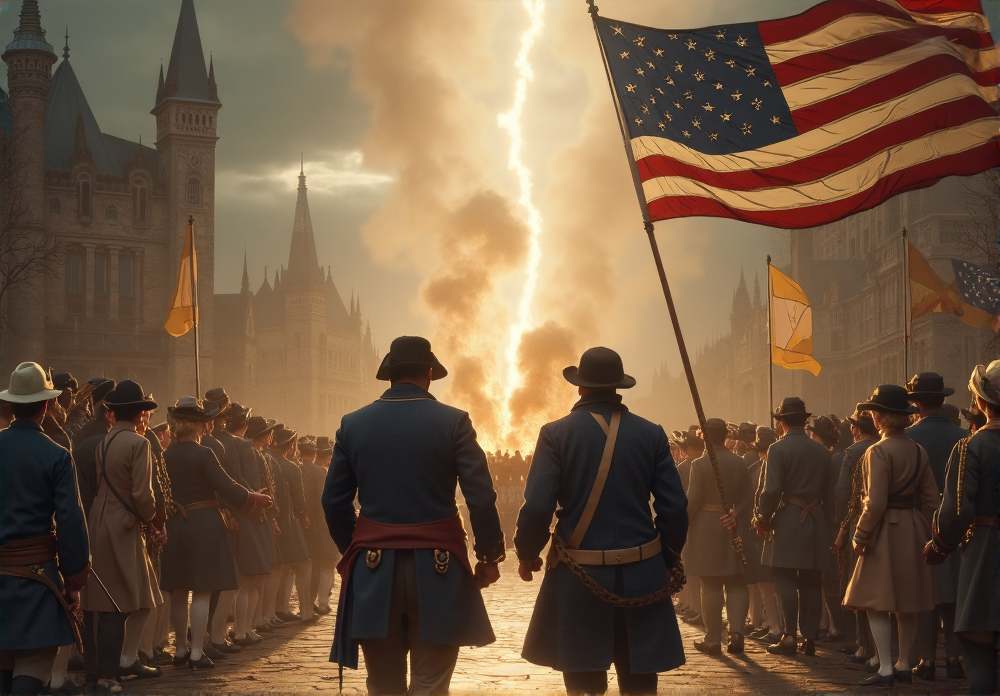The American Revolution was a pivotal moment in world history, shaping not only the future of the United States but also inspiring revolutionary movements across the globe. The words spoken and written during this tumultuous period continue to resonate today, offering insights into the ideals and struggles that defined the birth of a nation. In this article, we’ll explore some of the most famous quotes from the American Revolution, analyzing their significance and enduring impact.
1. “Give me liberty, or give me death!” – Patrick Henry:
Patrick Henry’s impassioned plea to the Second Virginia Convention in 1775 encapsulates the revolutionary spirit that drove the American colonists to fight for their independence. This quote, delivered at St. John’s Church in Richmond, Virginia, is perhaps the most famous from the entire revolutionary period.
Analysis
:
The power of Henry’s words lies in their stark simplicity and the ultimate choice they present. By framing the struggle for independence as a matter of life and death, Henry elevated the cause beyond mere political disagreement to a fundamental human right. This quote continues to inspire freedom movements worldwide and is often invoked in modern political discourse when civil liberties are perceived to be under threat.
The relevance of Henry’s words extends to contemporary issues such as government surveillance, freedom of speech, and the balance between security and liberty in the post-9/11 era. The quote serves as a reminder that the price of freedom is eternal vigilance, a concept that remains as pertinent today as it was in 1775.
2. “We hold these truths to be self-evident, that all men are created equal, that they are endowed by their Creator with certain unalienable Rights, that among these are Life, Liberty and the pursuit of Happiness.” – Thomas Jefferson, The Declaration of Independence:
This powerful statement from the Declaration of Independence forms the philosophical foundation of the United States and has inspired countless human rights movements around the world.
Analysis
:
Jefferson’s words represent a radical departure from the prevailing political philosophies of the time, which often justified monarchical rule and social hierarchies. By asserting that all men are created equal and possess inherent rights, the Declaration laid the groundwork for future struggles for equality, including the abolition of slavery, women’s suffrage, and the civil rights movement.
The phrase “pursuit of Happiness” is particularly noteworthy, as it elevates personal fulfillment to the status of a fundamental right. This concept has become deeply ingrained in American culture and has influenced everything from economic policies to self-help literature.
In the modern context, this quote continues to be invoked in debates over social justice, income inequality, and human rights. Its universality has made it a touchstone for progressive movements worldwide, demonstrating the enduring power of the ideals expressed in the American Revolution.
3. “These are the times that try men’s souls.” – Thomas Paine, The American Crisis:
Paine’s words, written during the darkest days of the Revolutionary War, capture the sense of urgency and sacrifice that characterized the struggle for independence.
Analysis
:
This quote, from the opening of Paine’s series of pamphlets titled “The American Crisis,” speaks to the transformative nature of revolution and the personal toll it exacts on those who participate. By acknowledging the difficulty of the times, Paine simultaneously validates the struggles of his fellow revolutionaries and challenges them to persevere.
The relevance of this quote extends far beyond the American Revolution. It has been invoked during numerous crises throughout history, from the Civil War to the Great Depression to the challenges of the COVID-19 pandemic. The phrase serves as a reminder that periods of great difficulty can also be opportunities for growth, change, and the reaffirmation of core values.
In the modern context, Paine’s words resonate with those facing political upheaval, economic hardship, or social unrest. They offer both a sobering assessment of challenging times and an implicit call to action, urging readers to rise to the occasion and demonstrate their commitment to their ideals.
4. “I only regret that I have but one life to lose for my country.” – Nathan Hale:
These purported last words of Nathan Hale, uttered before his execution as a spy by the British in 1776, have become a powerful symbol of patriotic sacrifice.
Analysis
:
Hale’s statement, whether apocryphal or not, encapsulates the depth of commitment that many revolutionaries felt towards the cause of independence. It transforms the act of dying for one’s country from a tragedy into a noble sacrifice, elevating patriotism to the level of religious devotion.
The quote has had a lasting impact on American culture, shaping notions of civic duty and national service. It has been invoked countless times during wartime to inspire soldiers and civilians alike, and has been memorialized in literature, art, and public monuments.
In the modern era, Hale’s words continue to resonate, particularly in discussions about military service, volunteerism, and civic engagement. They raise important questions about the nature of patriotism and the extent of individual sacrifice for the greater good, issues that remain relevant in an increasingly globalized world.
Conclusion:
The quotes from the American Revolution continue to shape our understanding of democracy, freedom, and civic responsibility. Their enduring power lies not just in their historical significance, but in their ability to speak to universal human aspirations and challenges. As we grapple with the complexities of the 21st century, these revolutionary words offer both inspiration and a framework for addressing contemporary issues, reminding us of the ongoing struggle to realize the ideals of liberty and equality.
